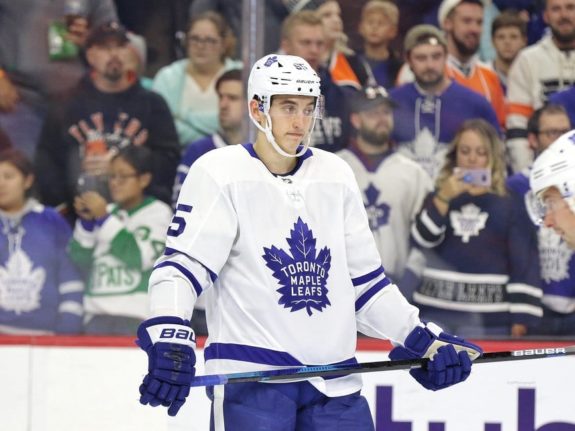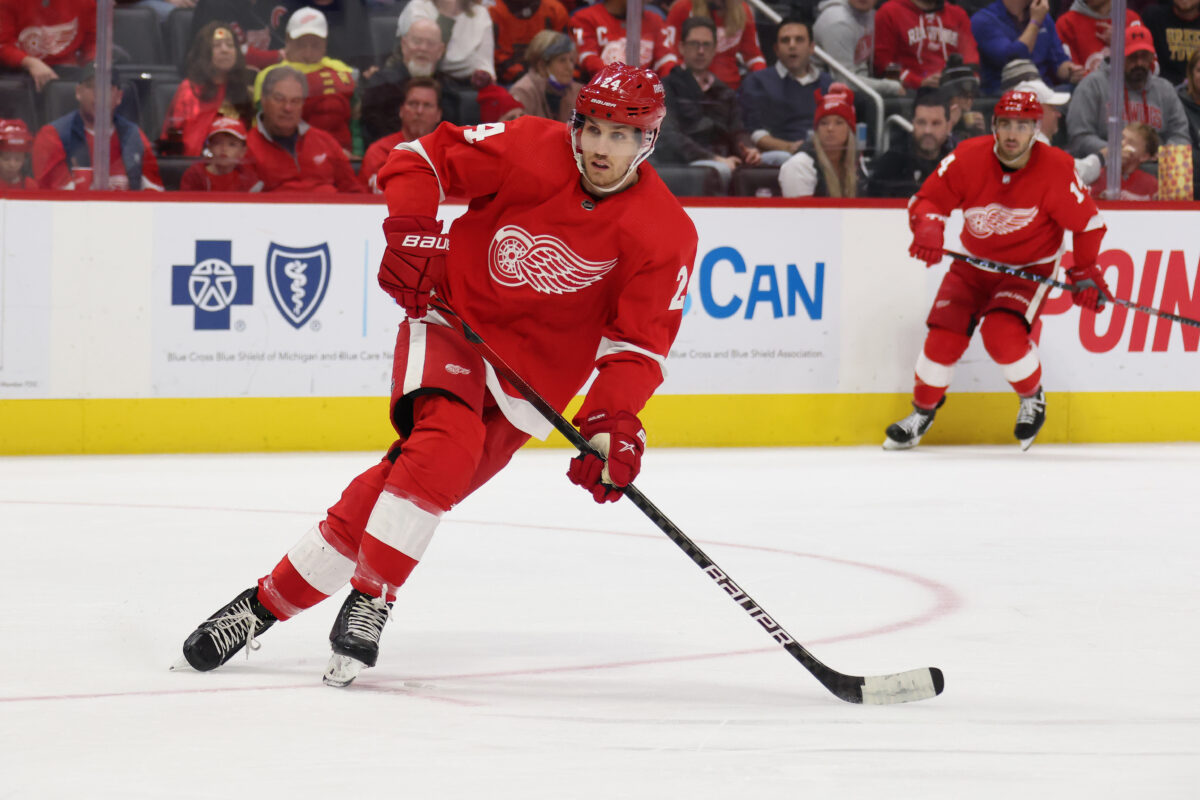It’s exceedingly rare that any Stanley Cup contender is exceptional in all facets of play, especially in the modern salary cap era. Financial constraints often require constant roster maneuvering which contributes to the likelihood that a team has a hole somewhere in their lineup. For the Colorado Avalanche, that hole is their penalty kill, with their shorthanded units neutralizing 75.6% of opposing power-play opportunities, the fifth-worst mark in the NHL.
If the Avalanche are to triumph over their dreaded playoff demons, rolling out two effective special teams units is a key component to prospective success. Here are three impactful, but cost-effective trade options for the Avalanche to consider acquiring in order to fix their woeful penalty-kill.
Ilya Mikheyev, Toronto Maple Leafs
For an Avalanche team preparing to juggle contract talks with 12 impending free agents from its main roster, Ilya Mikheyev of the Toronto Maple Leafs offers a cheap, flexible option to bolster their postseason aspirations. He’s only owed $1.65 million against the cap (and even less as the season goes on due to cap accrual) and is unsigned beyond this season. You may be wondering, why would a cap-strapped franchise intent on supplementing its expensive core with cost-effective options willingly relinquish a player who fits that very description? Let’s take a trip down memory lane, shall we?
Mid-way through an electrifying rookie campaign in which he had scored 23 points in 39 games, Mikheyev suffered a laceration to his wrist which forced him to miss the remainder of the 2019-20 regular season. In the 67 games that followed (both regular season and playoffs) Mikheyev’s production took a noticeable hit, only racking up 17 points since returning from injury. Pinpointing how significant his health issues have been is difficult, but it’s inarguable that Mikheyev’s stick-handling ability has been impaired to some extent. His recent thumb surgery can’t be doing him any favours, either.

The Maple Leafs have several cap concerns of their own stemming from Morgan Rielly’s contract extension, the need to extend Vezina Trophy hopeful Jack Campbell, and the expiring deals of several depth pieces. For Kyle Dubas and company, Mikheyev is a likely casualty of the stagnant salary cap and Colorado could snag an inexpensive solution to their penalty-killing woes as a result. That his counting stats are so diminished works in his team’s favour, as a player’s defensive impact is a much tougher sell in contract negotiations.
Even so, Mikheyev is one of the NHL’s premier short-handed threats, consistently manufacturing scoring opportunities with his team down a man. Among the players to have played a minimum of 50 minutes on the penalty kill since 2019-20, Mikheyev ranks second in shots-per-60, third in individual scoring chances created per-60, and 31st in penalties drawn per-hour. His intuitive reading of the game coupled with his blazing speed allows him to intercept passes and rapidly accelerate towards his opponent’s goal.
Related: 3 Maple Leafs Who Probably Won’t Return Next Season
Rumours sprung up around the beginning of training camp that Mikheyev and his agent had submitted a trade request, only to be denied by Maple Leafs’ management. Mikheyev quickly dismissed the murmurs but considering much of the discussion stemmed from Elliotte Friedman’s trusted reporting, the winger’s objections seem limp in retrospect.
All things considered, Mikheyev represents the ideal blend of low acquisition cost, short-term commitment, and relative youth at 27 years old. Only one question remains: do Sheldon Keefe and Kyle Dubas see him in their postseason plans?
Pius Suter, Detroit Red Wings
The Detroit Red Wings are surprisingly in the thick of the Eastern Conference playoff race, but it’s difficult to imagine them maintaining their unexpectedly strong start with such poor underlying numbers. They control just under 46% of all shot attempts (CF%), and struggle to maintain a positive ledger of expected goals (48.3%) at five-on-five.
It’s possible that their rookie stars and dependable goaltending takes them to the postseason for the first time since 2016, but don’t pencil them into the playoffs just yet. Taking calls on versatile utility-forward Pius Suter could become a reality once the trade deadline rolls around, with Detroit aiming to return to prominence by resolutely building through the draft.
Like Mikheyev, Suter is a proactive penalty killer who forces the other team’s offensive stars to defend against unexpected outbreaks. He’s sixth in shots-per-60, and manages to fashion quality chances out of that impressive volume, ranking 20th in individual expected goals per hour. He isn’t a workhorse on the penalty kill (he averages under a minute of PK time per game), but he’s a valuable supporting piece who can relieve Colorado’s primary short-handed soldiers.

Outside of his effectiveness on the penalty kill, Suter could easily slot in among Colorado’s talented cadre of top-nine forwards, potentially substituting for pending free agents in Andre Burakovsky and Nazem Kadri. The Swiss attacker has scored 42 points in 86 games over two NHL seasons, displaying his multifaceted package. For an organization looking for cost-certainty amidst the ticking time-bomb of Nathan MacKinnon’s gargantuan contract extension, Suter fits the bill.
Related: 5 Reasons the Avalanche Are Still Favorites to Win the Stanley Cup
Of the three potential trade targets, Suter is the most expensive as he carries a cap hit of $3.25 million through to the end of next season. However, Detroit’s ample cap room means a chunk of salary can be retained, with potential sweeteners coming back to add to the bounty of draft picks the team already owns in the 2022 Entry Draft. Challenging for an early playoff appearance is appetizing to say the least, but management maven Steve Yzerman likely has bigger goals in mind, making Suter an attractive trade commodity.
Trevor Moore, Los Angeles Kings
Yes, Trevor Moore is the third forward on this list of penalty killers – sue me. The trend of penalty killers being deployed with a more attacking mindset is in stark contrast to the traditionally conservative philosophy surrounding short-handed play. Rather than sitting back and hoping that the opponent fails to score, teams now regularly attempt to catch power-play units unaware, facilitating odd-man rushes with aggression.
The Los Angeles Kings‘ pint-sized winger utilizes his agility and evasiveness to good effect, regularly generating high-leverage chances while short-handed. Moore thrives off of creating rush chances (10th-highest per-60 rate since 2019-20), which contributes to his prolific rate of high-danger chances (seventh among forwards). Whether he’s leading an odd-man rush or darting through traffic, Moore finds a way to consistently disrupt opposing power plays.
Moore’s contract runs through to the end of the 2022-23 season, and counts for $1.875 million against the salary cap. He’s still in his prime at age 26, but the Kings could be hoping to make room for the talented crop of prospects rising through their ranks. If he does hit the trade block, an affordable depth piece capable of adapting to various roles in the lineup should entice no shortage of suitors, and the Avalanche should be first in line.
Penalty Kill Problems Loom Large for Avalanche in 2022
Acquiring any of the three listed skaters adds to Colorado’s enviable collection of penalty killers who can rapidly turn defensive stops into offensive opportunities with their combination of intelligence and quickness. Each one is relatively affordable, and none carry long enough term which impedes the Avalanche’s ability to retain their high-priced talent. The team may choose to enter the postseason with their current group, but that is a significant roll of the dice. Can they trust their penalty kill to hold the fort when a series win is on the line?
